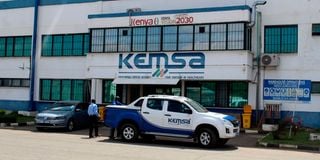A look at the latest scandal involving Kemsa

Kenya Medical Supplies Authority (Kemsa) Embakasi warehouse, Nairobi on December 1, 2020. Rogue Ministry of Health officials may have embezzled at least $1.353 million (Sh185 million) in a donor-funded campaign that has left the government staring at refunds and potential sanctions from the Geneva-based Global Fund.
The Kenya Medical Supplies Authority (Kemsa) has been in the news this week since news broke of a botched Sh3.7 billion tender for the supply of treated bed nets to prevent malaria in millions of low-income households.
President William Ruto has sacked the Principal Secretary for Public Health, Josephine Mburu, and the entire board of the government agency.
He has also suspended its chief executive, Ms Terry Ramadhani.
As part of the overhaul of the medical supplies agency, Health Cabinet Secretary Susan Nakhumicha also sent home other affected senior staff working under the National Malaria Programme and Kemsa at the Ministry of Health.
But what is Kemsa? What do they do? And why is it in the news?
Nation breaks it down.
Kemsa is the sole supplier of drugs to district health facilities.
In other words, it is a specialist medical logistics provider for public health facilities and programmes.
It is a government-owned company under the Ministry of Health by virtue of the Kemsa Act 2013.
Traditionally, Kemsa purchases, stores and delivers medicines to public health centres and public hospitals in the country.
The parastatal's advantage is that it receives a large discount from manufacturers.
Kemsa was created to replace a number of medical store administrations that had existed under different names since 1901.
Its mission is to improve healthcare through the efficient procurement and reliable distribution of quality medical supplies and the promotion of rational drug use and practice.
The authority has two warehouses in Nairobi and eight depots across the country to enhance flexible and rapid response to customer needs, with the widest national coverage of 8,700 health facilities.
It is funded by multilateral and bilateral aid agencies that fund health in the country, including the World Health Organization, Unicef, the Global Fund, USAid, Danida, the Clinton Foundation and the US President's Emergency Plan for AIDS Relief (Pepfar).
The enactment of the Health Laws (Amendment) Act, 2019, gave Kemsa an absolute monopoly over the supply of drugs to the public and made it mandatory for both national and county health facilities to obtain drugs and medical supplies from the agency.
The law introduced a two-year jail term or a Sh2 million fine for anyone who fails to procure from Kemsa.
The agency is no stranger to allegations of corruption.
In 2020, KEMSA was allegedly accused of mishandling a Sh7.7 billion tender in which it lost Sh1.5 billion in shady deals for the procurement of COVID-19 personal protective equipment, prompting then President Uhuru Kenyatta to dissolve the entire board in April last year.
The Ethics and Anti-Corruption Commission cited irregular expenditure arising from tenders awarded to politically-connected companies.
There were also billions of shillings worth of dead stock from a procurement scam in which a few individuals pocketed billions for supplying equipment and other items to the agency at far above market rates.
In response, the Ministry of Health announced that Kemsa would be reformed to ensure that Kenyans get value for money.
Has this worked? How far along are the reforms? Either way, Kemsa is likely to remain in the news.





